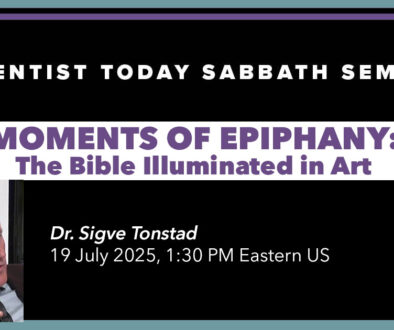Righteousness by Faith Is a Wrestling Match with God
30 September 2021 |
Read this paper for our class this week.
To believe is to wrestle with God. It is in the moments when we question God, when we doubt God, that we are closest to God.
But that’s often not how righteousness by faith is presented or understood. Sola fide, the central doctrine for Martin Luther “by which the church stands or falls,” has deep roots in the Hebrew Bible. Abram “believed in the LORD, and the LORD reckoned it to him as righteousness.” (Gen 15:6 NRSV). Over the past five hundred years theologians have debated the doctrine of faith not from the context of Abraham’s story but via Paul’s expositions in Romans 4 where Abraham figures as an illustration that salvation is by faith and not works. The primary concern for Paul in the Letter to the Romans was salvation with faith at its center. In this paper I will go back to the Hebrew roots of sola fide and read Genesis 15 from the perspective of dialogue and personal interaction framed into unique narrative structures.
For Abraham, the pivotal questions were “What do I get out of this?” and “How do I know?”
The first question, “what do you give me?” implies point blank that the promise of the heir is still not fulfilled. The emotions of ten years of waiting boil over. Disappointment, distrust and cynicism mix. God responds accordingly in emphatic and unambiguous language: “this man will not be your heir; but one who will come forth from your own body, he shall be your heir” (v. 4).
The second question, “how do I know?” is a retort to the promise of the land. Yet Abram’s “He believed,” falls again between “what do I get?” and “how do I know?”
Do you hear these questions? I hear them asked in the big classrooms and in small conversations. What do I get? And how do I know?
What is faith? How are we to communicate faith? The theological discussion about faith has enjoyed a long ride on the roller coasters of different philosophies and methodologies especially in the aftermath of the Reformation. Today a new entrant to this list has arisen; they call it metamodernism. Its emphasis is on the paradox, the juxtaposition, on oscillation between diametrically opposed poles, on a narrative, even a metanarrative, because there is so much craving for hope and meaning of life out there. Dialogue, not dialectics, questions, not answers, is what the metamodern person expects. S/he will often identify as spiritual but not religious, or as agnostic. Secular people need faith, too. Not creed or dogma, but faith in what is meaningful within our own reality.
Abraham was not called faithful and righteous when he was on top of Mount Moriah willing to offer up his son, but when he dared to raise questions and express doubt. In this class I argue that faith belongs between questions, in a wrestling match with God.
—Mathilde Frey
Guest teacher:
Mathilde Frey, Ph.D., is Professor of Old Testament/Hebrew Bible at Walla Walla University.
Moderator:
How to join:
This class is over. You can watch a recording of it here.
When:
ATSS starting time depends on where you are. If you’re on the west coast of the United States, it’ll be 10:30 AM. On the east coast, 1:30 PM.
Times around the world:
-
- Reykjavík: 5:30 PM
- College Place: 10:30 AM
- Lincoln: 12:30 PM
- Denver: 11:30 AM
- Bracknell: 6:30 PM
- Loma Linda: 10:30 AM
- Nairobi: 8:30 PM
- Gackle: 12:30 PM
- Hosur: 11:00 PM
- Waco: 12:30 PM
- Tulsa: 12:30 PM
- Helsinki: 8:30 PM
- Stockholm: 7:30 PM
- Hamburg: 7:30 PM
- Capetown: 7:30 PM
- Madrid: 7:30 PM
- Paris: 7:30 PM
- Honolulu: 7:30 AM
- Cooranbong: 3:30 AM (Sunday)
- Perth: 1:30 AM (Sunday)
The class is intended to last about 2 hours, though the conversation often continues to 4 PM.
About our class:
- The AT Sabbath Seminar is intended to be a courteous forum. We discuss and ask questions politely. We don’t accuse, get angry, or put people down.
- Stick to the topic in both comments and chat discussion.
- Make your comments and questions short—don’t dominate.
- Keep your microphones muted unless you are called upon to make your comment or ask your question.
- Indicate your interest in speaking by raising your electronic hand—under the “reactions” button.
- Please use your name when you sign in! Not your phone number, not your initials. This will help us differentiate you from unwelcome guests who want to disrupt us. You can set your name after signing on by clicking on the 3 dots next to your picture, which drops down a menu.
- If it should happen that we are attacked so that we have to stop the meeting, we’ll quickly post a new meeting link on our AT Facebook page.
We look forward to getting acquainted with you!
Coming up:
- October 9 – Laura Wibberding
- October 16 – Rebecca Liu
- November: Laurence Turner
- December: Denis Fortin on Ecumenism
- Stanley Patterson




